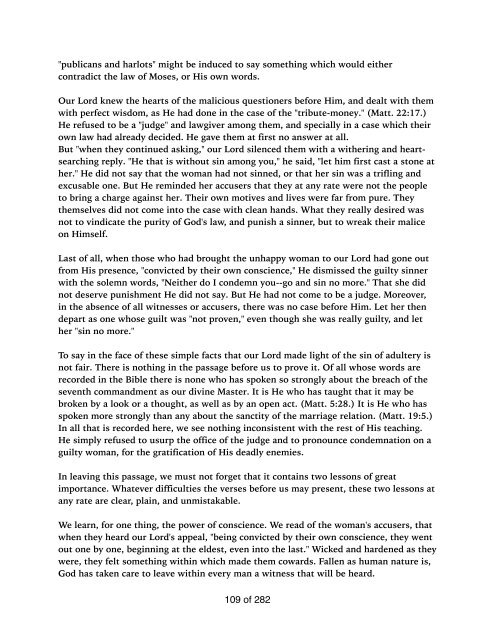The Gospel of John By J.C. ryle
Expository Thoughts on the Gospels Volume 4: John. Ignorance of Scripture is the root of every error in religion, and the source of every heresy. To be allowed to remove a few grains of ignorance, and to throw a few rays of light on God's precious word, is, in my opinion, the greatest honor that can be put on a Christian.
Expository Thoughts on the Gospels Volume 4: John. Ignorance of Scripture is the root of every error in religion, and the source of every heresy. To be allowed to remove a few grains of ignorance, and to throw a few rays of light on God's precious word, is, in my opinion, the greatest honor that can be put on a Christian.
Create successful ePaper yourself
Turn your PDF publications into a flip-book with our unique Google optimized e-Paper software.
"publicans and harlots" might be induced to say something which would either<br />
contradict the law <strong>of</strong> Moses, or His own words.<br />
Our Lord knew the hearts <strong>of</strong> the malicious questioners before Him, and dealt with them<br />
with perfect wisdom, as He had done in the case <strong>of</strong> the "tribute-money." (Matt. 22:17.)<br />
He refused to be a "judge" and lawgiver among them, and specially in a case which their<br />
own law had already decided. He gave them at first no answer at all.<br />
But "when they continued asking," our Lord silenced them with a withering and heartsearching<br />
reply. "He that is without sin among you," he said, "let him first cast a stone at<br />
her." He did not say that the woman had not sinned, or that her sin was a trifling and<br />
excusable one. But He reminded her accusers that they at any rate were not the people<br />
to bring a charge against her. <strong>The</strong>ir own motives and lives were far from pure. <strong>The</strong>y<br />
themselves did not come into the case with clean hands. What they really desired was<br />
not to vindicate the purity <strong>of</strong> God's law, and punish a sinner, but to wreak their malice<br />
on Himself.<br />
Last <strong>of</strong> all, when those who had brought the unhappy woman to our Lord had gone out<br />
from His presence, "convicted by their own conscience," He dismissed the guilty sinner<br />
with the solemn words, "Neither do I condemn you--go and sin no more." That she did<br />
not deserve punishment He did not say. But He had not come to be a judge. Moreover,<br />
in the absence <strong>of</strong> all witnesses or accusers, there was no case before Him. Let her then<br />
depart as one whose guilt was "not proven," even though she was really guilty, and let<br />
her "sin no more."<br />
To say in the face <strong>of</strong> these simple facts that our Lord made light <strong>of</strong> the sin <strong>of</strong> adultery is<br />
not fair. <strong>The</strong>re is nothing in the passage before us to prove it. Of all whose words are<br />
recorded in the Bible there is none who has spoken so strongly about the breach <strong>of</strong> the<br />
seventh commandment as our divine Master. It is He who has taught that it may be<br />
broken by a look or a thought, as well as by an open act. (Matt. 5:28.) It is He who has<br />
spoken more strongly than any about the sanctity <strong>of</strong> the marriage relation. (Matt. 19:5.)<br />
In all that is recorded here, we see nothing inconsistent with the rest <strong>of</strong> His teaching.<br />
He simply refused to usurp the <strong>of</strong>fice <strong>of</strong> the judge and to pronounce condemnation on a<br />
guilty woman, for the gratification <strong>of</strong> His deadly enemies.<br />
In leaving this passage, we must not forget that it contains two lessons <strong>of</strong> great<br />
importance. Whatever difficulties the verses before us may present, these two lessons at<br />
any rate are clear, plain, and unmistakable.<br />
We learn, for one thing, the power <strong>of</strong> conscience. We read <strong>of</strong> the woman's accusers, that<br />
when they heard our Lord's appeal, "being convicted by their own conscience, they went<br />
out one by one, beginning at the eldest, even into the last." Wicked and hardened as they<br />
were, they felt something within which made them cowards. Fallen as human nature is,<br />
God has taken care to leave within every man a witness that will be heard.<br />
109 <strong>of</strong> 282

















